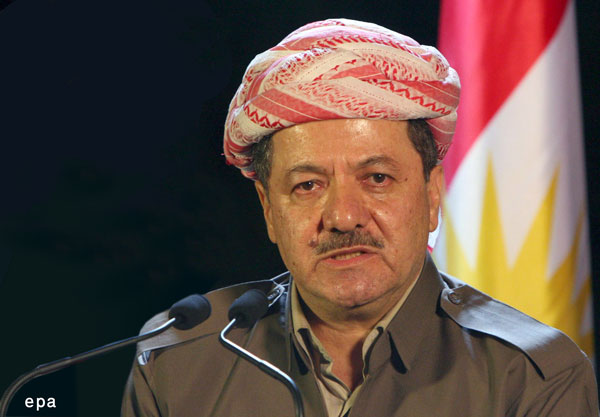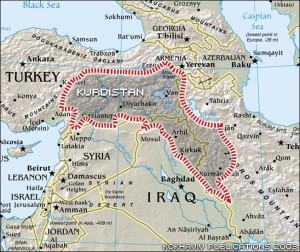July 11, 2014

The president of Iraqi Kurdistan has called for a referendum on whether the region should declare its independence, a move long expected but much feared in the Middle East.
The Islamic Republic has maintained official silence, seemingly unable to decide what to do.

Iran, whether under the monarchy or the Islamic Republic, has always opposed the independence urge in by Iraqi and Turkish Kurds for fear that would feed the independence urge among Iranian Kurds.
The only comment from within Iran since the announcement last Thursday came from Ayatollah Ahmad Khatami, one of the leaders of Tehran Friday prayers and a member of the Presiding Board of the Assembly of Experts.
Khatami lashed out at the referendum idea, calling it a plot” that could grow into another “cancerous tumor” in the region “like Israel.”
He complained that the talk of an independence referendum could grow into a scheme to create a Greater Kurdistan, a term that refers to a Kurdish state embracing the majority Kurdish areas of Turkey, Iran, Iraq and Syria. That has long been Iran’s fear.
He also expressed fear that unnamed others would push secession and set up other ethnic states, presumably a reference to nascent efforts to create an independent Baluchestan and to hive off the Arab areas of Iran.
And, of course, he blamed the United States for all of this, since Kurds, Baluchis and others could never have conceived of independence if it wasn’t for American meddling.
The call for the referendum was issued by Masud Barzani, the president of the Kurdistan Regional Government in Iraq. The vote would only be held in Iraqi Kurdistan. He was careful—as he always has been—not to speak of Kurdish areas in Turkey or Iran. Barzani has always maintained good relations with Turkey and Iran since the political efforts of Iraqi Kurds have always been dependent on those neighbors.
In Iran, both the monarchy and the Islamic Republic off-and-on armed the Iraqi Kurds, seeing them as very helpful in destabilizing an Iraq that was usually hostile to Iran until the Americans set up elections that brought the majority Shiites to power.
Barzani spoke behind closed doors to the Kurdish region’s freely elected parliament. The Associated Press obtained a copy of his speech. He asked the parliament to set up an electoral commission to “hurry up a referendum on self-determination.”
Barzani said, “You have to study this issue and take steps in this direction. It is time for us to determine our status in this world and not to wait for other people to decide it for us.”
Iran has not been helped by the fact that Turkey has softened its position on the Kurds. The Turkish government of Prime Minister Recep Tayyip Erdogan gets substantial electoral support from Kurdish areas and is now trying to negotiate peace with the Kurdish minority that would presumably grant some measure of local autonomy.
After Barzani spoke, the Turkish government did not criticize the call for a referendum and many commentators were even supportive of independence.
Bilgay Duman of the Ankara-based Center for Middle Eastern Strategic Studies told Agence France Presse Iraqi Kurdistan has become Turkey’s closest ally in the region and a major trading partner. Furthermore, Turks now recognize that the Iraqi Kurds are distinct from the Turkish Kurds and no longer fear a Greater Kurdistan movement. He said many Turks view Iraqi Kurdistan as a buffer zone protecting it from a disorderly Iraq.
Turkish Kurds also have a problem talking about independence given that in recent decades so many of them have left the area of southeastern Turkey that is their heartland. Some estimates say half of all the Kurds in Turkey now live outside the heartland. Independence for the heartland would strand those Kurds.
The silence from the Islamic Republic suggests that some people in the establishment there may be thinking similarly to the Turks. But even if Iranian and Turkish officials decide in the end to accept an independent Kurdistan in Iraq, they are not likely to embrace with it public enthusiasm for fear of promoting such thoughts among their own Kurds.
Iran also has a problem that Turkey does not have. Unlike Turkey, Iran is close to the Shiite-majority government in Baghdad that is hostile to any talk of Kurdish independence. So, even if Tehran decides to accept an independent Kurdish state, it is also likely to remain mum about it.
But comments like those by Khatami telegraph that the regime has not yet decided what to do about Barzani’s proposed referendum.
